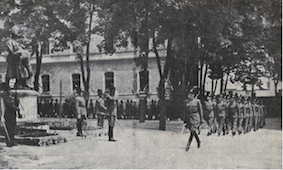Events
The Vienna Wiesenthal Institute for Holocaust Studies (VWI) organises academic events in order to provide the broader public as well as an expert audience with regular insights into the most recent research results in the fields of Holocaust, genocide, and racism research. These events, some of which extend beyond academia in the stricter sense, take on different formats ranging from small lectures to the larger Simon Wiesenthal Lectures and from workshops addressing an expert audience to larger international conferences and the Simon Wiesenthal Conferences. This reflects the institute’s wide range of activities.
The range of events further extends to the presentation of selected new publications on the institute’s topics of interest, interventions in the public space, the film series VWI Visuals, and the fellows’ expert colloquia.
| VWI invites/goes to... | |||
| Judit Molnár: Crime and Punishment? The Hungarian Gendarmerie during and after the Holocaust | |||
Wednesday, 4. November 2015, 19:00 - 20:30 Balassi Institute – Collegium Hungaricum Vienna, 1020 Wien, Hollandstraße 4
|
|||
VWI goes to the Collegium Hungaricum
The Royal Hungarian Gendarmerie was one of the most important state institutions between 1881 and 1945. Its task was to preserve law and order in the countryside, to prevent peasant uprisings as well as a socialist agitation in the villages, and, in 1944, to deport the Hungarian Jews to Auschwitz.
Comments by Marius Wigl
Judit Molnár is Senior Research Fellow at the VWI. She is Associate Professor at the University of Szeged since 1998. From 1994, she is also the deputy director of the Hungarian research group of the Yad Vashem Archives. She organised the first Hungarian permanent Holocaust exhibition in Budapest (2004-2006) and was the chief historical advisor at the Holocaust Memorial Centre between 2009 and 2011. Her research field is the history of the Jews in Hungary in the 20th century. She focuses on the history of the Hungarian Jewish Leaders during the Second World War and the Role of the Royal Hungarian Gendarmerie in the Holocaust.
Marius Weigl is a historian; at the moment he is a PhD candidate in the Interdisciplinary PhD Programme at the Alpen-Adria University of Klagenfurt. His research field is "Science – Administration – Police: The Solution of the 'Gypsy Question' in Austria-Hungary during WWI".
In cooperation with:
|
|||











 To address this question, the size of the gendarmerie and the number of those participating in the deportation must be made clear. Their connection with other agencies, above all the police and the administration, as well as their attitudes to the persecution of Jews and to deportations must be clarified. Were the gendarmes cruel, as most of the survivors claim, or, on the contrary, did they help the persecuted, protest, or perhaps refuse to obey orders, as former gendarmes claim and some people in Hungary are still trying to have the public believe? And finally, what did they, what could they know about the destination of the deporting trains, about the true, final end of the deportations?
To address this question, the size of the gendarmerie and the number of those participating in the deportation must be made clear. Their connection with other agencies, above all the police and the administration, as well as their attitudes to the persecution of Jews and to deportations must be clarified. Were the gendarmes cruel, as most of the survivors claim, or, on the contrary, did they help the persecuted, protest, or perhaps refuse to obey orders, as former gendarmes claim and some people in Hungary are still trying to have the public believe? And finally, what did they, what could they know about the destination of the deporting trains, about the true, final end of the deportations? 
